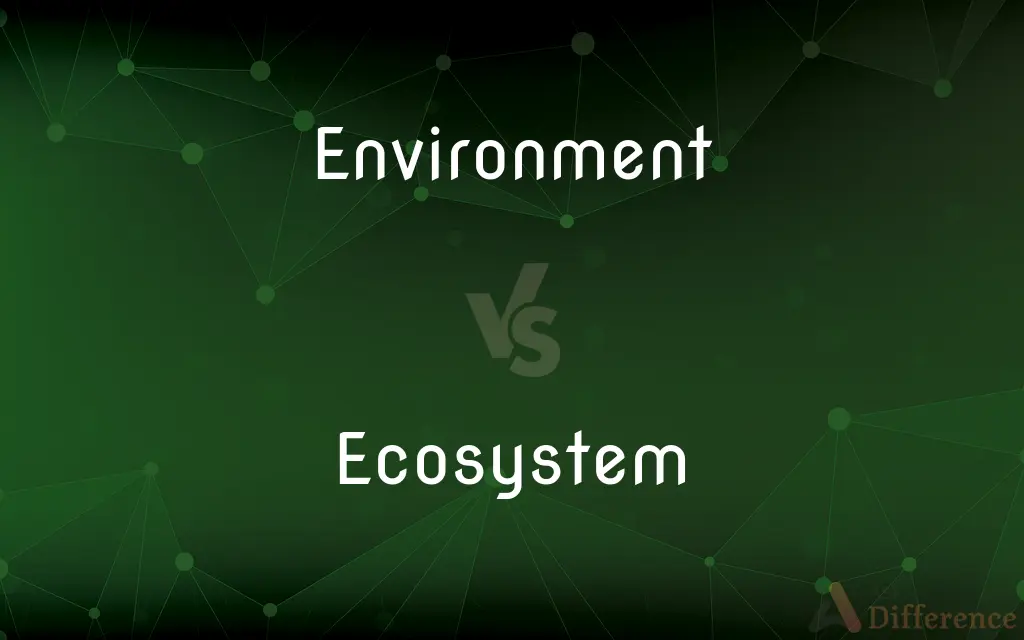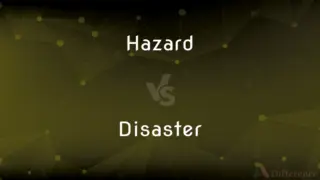Environment vs. Ecosystem — What's the Difference?
By Tayyaba Rehman — Updated on September 16, 2023
Environment is the surroundings or conditions in which an organism lives, while an ecosystem comprises a community of living organisms and their physical environment, interacting as a system.

Difference Between Environment and Ecosystem
Table of Contents
ADVERTISEMENT
Key Differences
The term Environment encompasses all external factors affecting an organism or community, regardless of being living or non-living. On the other hand, an Ecosystem specifically refers to both living organisms and their direct physical surroundings which interact as a cohesive unit.
Environment generally serves as a broader context that includes elements like weather, culture, and socio-economic factors which might not be directly related to a biological setup. Ecosystem, in contrast, focuses on the intricate relationships and energy flow between living organisms and their immediate physical surroundings.
While every Ecosystem is part of the broader Environment, not every element of the Environment can be directly linked to a particular ecosystem. For instance, global economic policies are part of the global environment but might not influence a specific forest ecosystem directly.
Changes in the Environment can impact multiple ecosystems, even if they are distant or unrelated. But disturbances in an Ecosystem might have localized effects unless it's a major change that can ripple out and influence broader environmental aspects.
An individual organism interacts with its Environment on many levels, from the physical to the social. But within an Ecosystem, the emphasis is on the biological interplay between organisms (biotic) and their abiotic (non-living) environment.
ADVERTISEMENT
Comparison Chart
Definition
Surroundings and conditions affecting organisms.
Community of organisms and their physical environment interacting as a system.
Components
Both biotic and abiotic, broad context.
Biotic and abiotic components, specific interactions.
Scale
Can be local to global.
Typically more localized.
Interactions
Broad, including socio-cultural and physical.
Focused on biological and physical interplay.
Dependency
Organisms depend on the environment for survival.
Organisms within ecosystems depend on each other and their physical surroundings.
Compare with Definitions
Environment
The external context or setting in which something exists or happens.
The political environment of the country is changing rapidly.
Ecosystem
A community of living organisms and their physical environment, interacting as a system.
The rainforest ecosystem is rich in biodiversity.
Environment
The total of external influences affecting the life and development of an organism or community.
The school environment plays a crucial role in a child's learning.
Ecosystem
A complex set of relationships among living and non-living components.
Urban ecosystems are shaped by both nature and human-made structures.
Environment
The natural world, including land, air, water, and living organisms.
Pollution has caused irreversible harm to our environment.
Ecosystem
A specific biological community and its physical environment, functioning together.
Coastal ecosystems are vulnerable to rising sea levels.
Environment
The surroundings or conditions in which a person, animal, or plant lives or operates
Survival in an often hostile environment
Ecosystem
A network of interactions among organisms, and between organisms and their surroundings.
Overfishing can disrupt marine ecosystems.
Environment
The natural world, as a whole or in a particular geographical area, especially as affected by human activity
The impact of pesticides on the environment
A parliamentary environment committee
Ecosystem
An interconnected system where energy and materials flow between organisms and their environment.
Grasslands are a type of ecosystem where herbivores play a pivotal role.
Environment
The totality of the natural world, often excluding humans
"Technology, of course, lies at the heart of man's relationship with the environment" (Mark Hertsgaard).
Ecosystem
An ecosystem (or ecological system) consists of all the organisms and the physical environment with which they interact. These biotic and abiotic components are linked together through nutrient cycles and energy flows.
Environment
A subset of the natural world; an ecosystem
The coastal environment.
Ecosystem
An ecological community together with its environment, functioning as a unit.
Environment
The combination of external physical conditions that affect and influence the growth, development, behavior, and survival of organisms
"Conditions in a lion's environment ... can drive it to hunt people" (Philip Caputo).
Ecosystem
A system formed by an ecological community and its environment that functions as a unit.
Environment
The complex of social and cultural conditions affecting the nature of an individual person or community.
Ecosystem
The interconnectedness of organisms (plants, animals, microbes) with each other and their environment.
Environment
The general set of conditions or circumstances
A terrible environment for doing business.
Ecosystem
(by extension) A network of interconnected people or organisations that resembles a natural ecosystem due to the complex interdependencies.
The company’s ecosystem mainly comprises its supply chain, customers, end consumers and competitors.
Environment
The entire set of conditions under which one operates a computer, as it relates to the hardware, operating platform, or operating system.
Ecosystem
A system formed by the interaction of a community of organisms with their physical environment
Environment
An area of a computer's memory used by the operating system and some programs to store certain variables to which they need frequent access.
Environment
The surroundings of, and influences on, a particular item of interest.
Environment
The natural world or ecosystem.
Environment
All the elements that affect a system or its inputs and outputs.
Environment
A particular political or social setting, arena or condition.
Environment
(computing) The software and/or hardware existing on any particular computer system.
That program uses the Microsoft Windows environment.
Environment
(programming) The environment of a function at a point during the execution of a program is the set of identifiers in the function's scope and their bindings at that point.
Environment
(computing) The set of variables and their values in a namespace that an operating system associates with a process.
Environment
Act of environing; state of being environed.
Environment
That which environs or surrounds; surrounding conditions, influences, or forces, by which living forms are influenced and modified in their growth and development.
It is no friendly environment, this of thine.
Environment
The totality of surrounding conditions;
He longed for the comfortable environment of his livingroom
Environment
The area in which something exists or lives;
The country--the flat agricultural surround
Environment
The surroundings or conditions in which an organism lives.
The harsh desert environment challenges the endurance of animals living there.
Environment
The conditions or influences under which any action or process occurs.
Growing plants in a controlled environment yields better results.
Common Curiosities
Is every ecosystem part of an environment?
Yes, every ecosystem is a subset of a broader environment.
Can an ecosystem impact its surrounding environment?
Yes, ecosystems can influence their surroundings, such as forests affecting regional climate patterns.
How do changes in the environment affect ecosystems?
Changes in the environment can influence temperature, precipitation, and other factors that ecosystems depend on, impacting their health and function.
How broad is the term 'Environment'?
Environment can refer to any external factors, from global climate patterns to an individual's socio-cultural surroundings.
What's the basic difference between Environment and Ecosystem?
Environment refers to the surroundings or conditions affecting an organism, whereas Ecosystem describes a community of living organisms and their physical environment interacting as a system.
Why is the balance in an ecosystem important?
It ensures stability, resilience, and the continued survival of organisms within that ecosystem.
Can an environment exist without an ecosystem?
Yes, environments can exist without specific ecosystems, as environment is a broader term that includes non-biological factors.
Do humans create their own environments?
Yes, humans create artificial environments, such as cities and indoor spaces.
What constitutes the physical component of an ecosystem?
It includes abiotic factors like soil, water, climate, and air.
Can there be multiple ecosystems within one environment?
Absolutely, a large environment like a forest may contain wetland, grassland, and river ecosystems.
What happens when one organism in an ecosystem is removed?
It can disrupt the balance, potentially affecting other organisms and the functioning of the ecosystem.
Are ecosystems always natural?
Mostly, but humans can create artificial ecosystems, like aquariums or terrariums.
Can the environment provide clues about the health of an ecosystem?
Yes, environmental factors like pollution levels can indicate disturbances in associated ecosystems.
Is climate change an environmental or ecosystem issue?
It's both. Climate change affects the broader environment and can have profound impacts on specific ecosystems.
How can individuals help maintain a balance in the environment and ecosystems?
By practicing sustainable living, reducing pollution, conserving resources, and supporting biodiversity conservation initiatives.
Share Your Discovery

Previous Comparison
Archives vs. Archive
Next Comparison
Hazard vs. DisasterAuthor Spotlight
Written by
Tayyaba RehmanTayyaba Rehman is a distinguished writer, currently serving as a primary contributor to askdifference.com. As a researcher in semantics and etymology, Tayyaba's passion for the complexity of languages and their distinctions has found a perfect home on the platform. Tayyaba delves into the intricacies of language, distinguishing between commonly confused words and phrases, thereby providing clarity for readers worldwide.















































